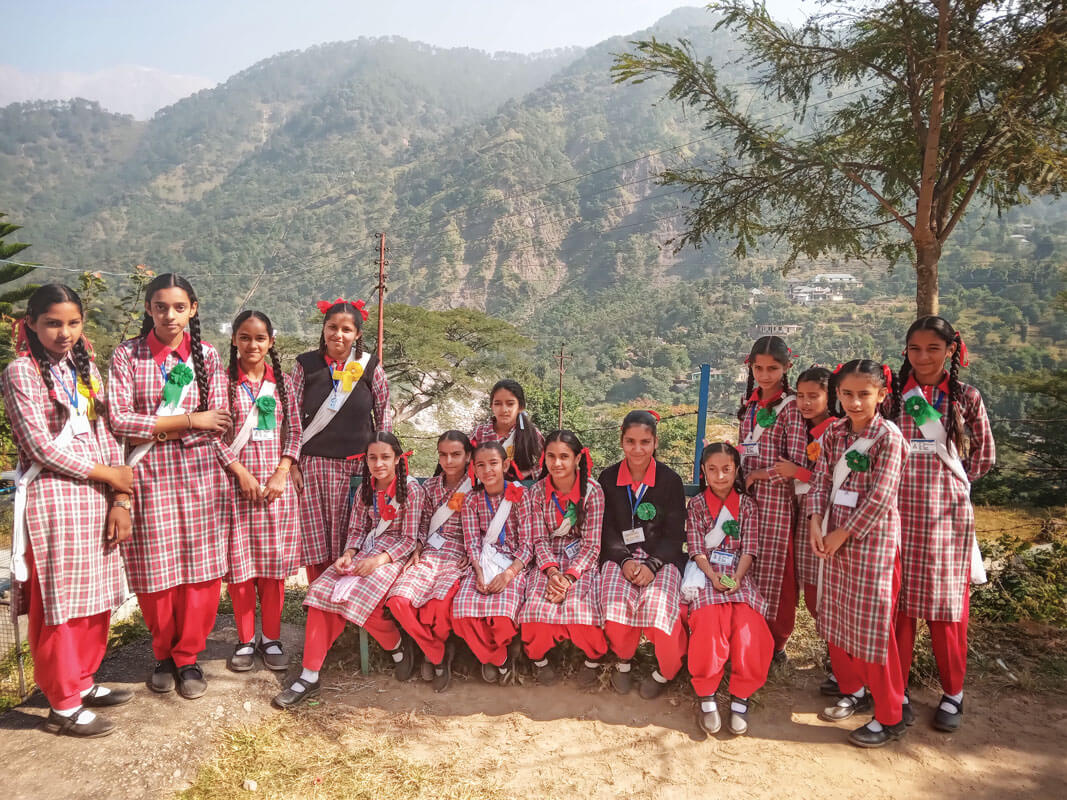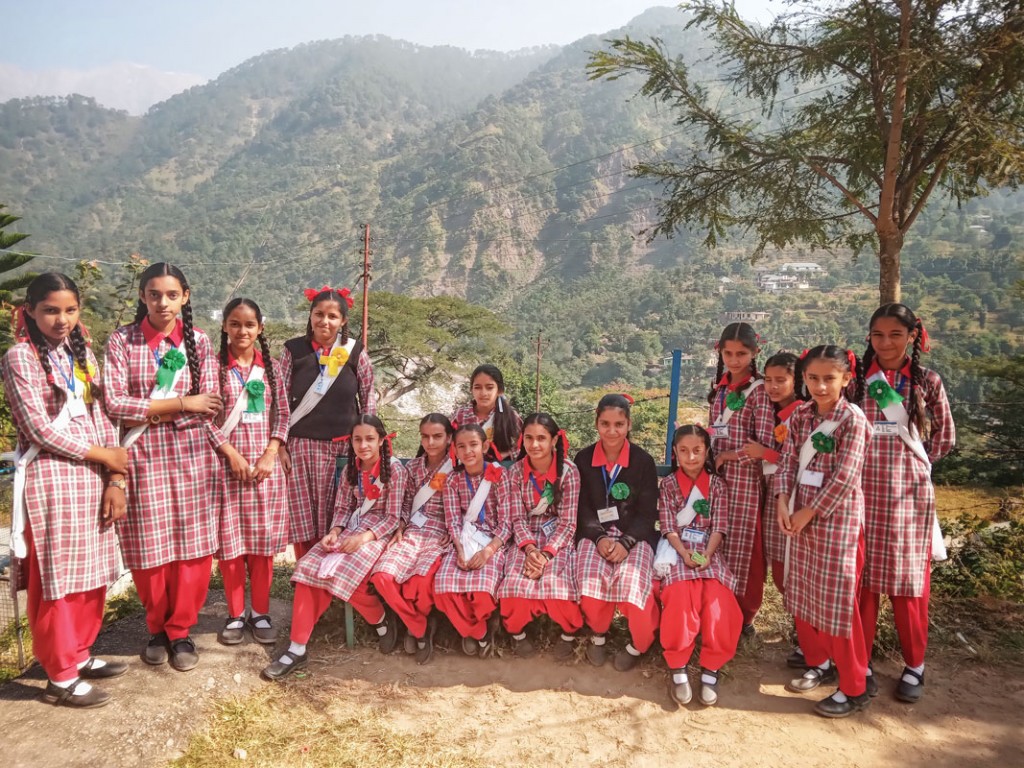The Rotary Club of Dharamshala (RID 3070) has transformed the manner in which a few hundred adolescent girls in the villages around this hill town attend school. All by the simple act of gifting them good quality washable and reusable sanitary napkins.

“A big problem in our villages is that many adolescent girls miss their classes for several days as they cannot manage their periods due to non-availability of sanitary napkins. So during my tenure as club president in 2020–21, when Kris Olson, a member of the WCS (World Community Service) Committee of RC Los Altos, California (RID 5170), approached me with the opportunity to run a project named “Save-A-Girl” in some surrounding villages of Dharamshala, I was very excited and eagerly accepted it,” says Milap Nehria, past president, RC Dharamshala.
It was after all an ideal opportunity to prevent adolescent girls from either dropping out of school or missing school for almost a week every month.

His immediate job was to identify some village schools in remote corners of Dharamshala. It helped that in some of these villages, the village head was a woman, so it was easy to get them on board to support this crucial project for their village girls. A few villages were selected, and the list was given to Olson, the American Rotarian. He then set about the task of raising the required funds — some $3,000 — after getting the okay from his club members to do this project.
This initiative from RC Los Altos is linked to the partnership the Rotary clubs in RID 5170 in the San Fransico Bay Area, US, have with The Global Uplift Project (TGUP), which is working to help around 11,000 adolescent girls in Africa and Asia stay in school. Both the partners agree that girls dropping out of school is “the greatest preventable human tragedy in the world,” as without adequate education, many of these girls are vulnerable to tragedies such as becoming child brides, or even worse, getting sucked into the human trafficking trade. RID 5170 comprises 63 clubs and has more than 3,800 members.

The collaboration provides adolescent girls in developing countries washable, reusable sanitary pads in a kit called Save a Girl (SaG), to help the girls manage their period in a safe and hygienic manner, so that they have no problem attending school during their menstrual cycle.
To get an understanding of how big a problem this is in the developing world, let’s look at UNICEF numbers, which indicate that over 20 million adolescent girls drop out of school every year because they cannot manage their monthly period. More shocking, this number might be as high as 50 million! Here TGUP comes into the picture; it has created a washable, reusable sanitary pad that costs $6 to make and lasts three years. More than 49,000 SaG kits have been distributed so far, in nine developing countries through this project, which is part of the initiative of Rotary’s ‘Empowering girls’ programme.
Returning to Dharamshala in India, RC Los Altos provided a cash grant of $3,000 for the purchase of 400 sanitary kits from TGUP’s production centre in Dang, Nepal. The kits, with three reusable pads and two panties, were transported through Kathmandu to Dharamshala. “We had some difficulties getting these shipped; they had to be packed and repacked a few times while in transit but finally we managed to get these sanitary kits to Dharamshala,” says Nehria.
This project was very dear to his heart, he explains, because “adolescent girls miss an average of four days of school every month — about 20 per cent of school time; thus they fall behind in their school work, many drop out and never finish their high school. This education gap puts women to a great disadvantage in the developing world, making it possible for them to earn only 40 per cent of what men earn,” he says.
It also makes women economically dependent on men, and the less educated girls end up with early marriage and early motherhood, and in low paying jobs, and working in the fields for daily wages or as domestic servants.
The sanitary kits reached Dharamshala by 2021-end, while Covid was still a threat. As soon as the Covid restriction were lifted, the Rotarians began their first distribution of the pads. “As per our agreement with RC Los Altos, we had to also educate the girls on menstrual hygiene and the importance of remaining in school and attending classes regularly. Dr Harmeet Kaur, our club member who is a gynaecologist, agreed to visit all these villages to talk to the girls on the issue. She walked with us to all these remote villages to educate the girls on MHM.”
They first went to the Satya Sai School in Salet Godam village of Dharamshala, which supports poor students from surrounding villages. Around 45 adolescent girls were given the pads along with MHM education. Next was Kareri and surrounding villages; the female head of the panchayat helped to get all the girls in one place. “It took us two hours from Dharamshala to drive to Kareri. The 150-odd girls waiting there were so happy to receive the kits and it was really a very satisfying experience to see the smiles on their faces as they received the kits,” says Nehria. The next distribution was at the multiskill development centre in Khaniyara village, which is supported by RC Dharamshala, and boys and girls are benefitting from the short-term courses run by the centre. There are around 40 village girls who come to study in the centre, and they were all given the sanitary kits.

After waiting for the monsoon rains to abate, the Rotarians organised a free medical camp in the remote village of Bhitlu. Around 40 girls from surrounding villages came to listen to Dr Harmeet, and were given the sanitary kits. The last distribution was done at the Ghaniyara Senior Secondary School where nearly 90 girls received the kits.
A club member, Aruna Prashar, provided written education material in Hindi to the girls.
Nehria adds that both RC Los Altos and TGUP, which has sewing centres in Africa and Nepal, are now looking at opportunities to set up sanitary napkin production centres to help more women in the Himalayan region and other remote areas of India. “Looking at our project, another local NGO has showed interest and wants to take it forward.”
Tree plantation
Giving details of another club project — Green Himalayan Plantation Drive — Nehria said for a few years now RC Dharamshala has been doing a plantation drive to preserve the green forest cover in this Himalayan region. “Himachal Pradesh is one of the richest states in terms of forest cover, with almost 66 per cent of the total land area having a green cover. While very old or fallen trees are cut by the state authorities and used as timber, the forest department of Himachal Pradesh is committed to keep the forest cover and plant thousands of new trees everywhere in the state. Rotarians of our club contribute every year towards this objective.”
This year too, the club has carried out three plantation drives, in collaboration with the Forest department, where the area is first fenced from all sides in order to protect the saplings from animals and other intruders. Proper pits are dug to plant the saplings of native trees such as deodar (cedar family coniferous tree) and oak trees on the higher reaches and wild fruit-bearing trees such as wild cherry, Kainth, etc in low elevation areas. One plantation drive was done in a school to make the younger generation aware about the need for green initiatives.
He explains that the deodar trees are high growing trees and mainly used as timber, but right now there is a moratorium placed by the government on the cutting of these trees. In every plantation drive only 55–60 saplings are planted; “more than the number, our aim is to raise awareness on the need to protect our environment. As we live in this beautiful region, most of us are very passionate about the environment and realise the need to protect the hills as the ecology here is very fragile,” he adds.
The club members are happy that the trees they had planted many years ago are now fully grown “and we are proud that we have set up a small garden of guava, silver oak and some other trees.”
The club is also raising funds for relief work in Manali, Mandi and Shimla, where there were a number of flash floods due to heavy rains. Dharamshala was not affected.









